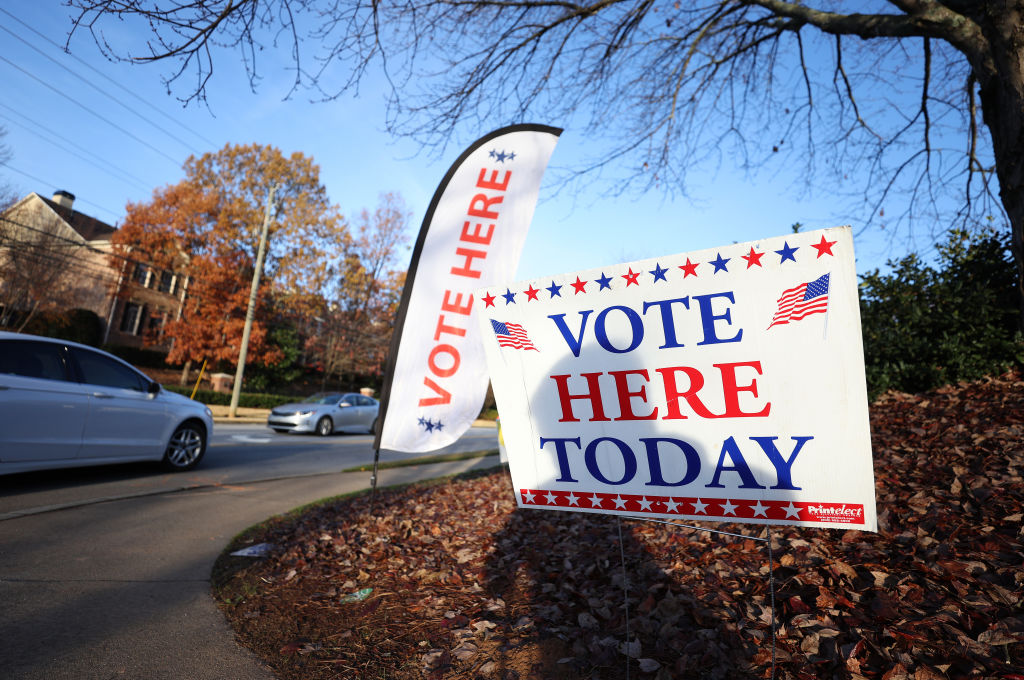The midterm bloodbath conservatives were salivating for devolved into, at best, a red tide. The Democrats held the Senate and have only a seven-seat deficit in the House. Senate Majority Leader Chuck Schumer is now hoping to grant citizenship to every warm body in the country and perhaps even others on their way here, while Senator Elizabeth Warren is more determined than ever to cancel the student debts of millions of bankrupt liberal arts majors. And an emboldened President Biden is threatening to run for re-election, whether anyone wants him to or not.
But amidst all the liberal revelry lies an uncomfortable, little-reported fact: Democrats lost the House popular vote by three points.
Remember the popular vote? The popular vote!
My goodness, Hillary Clinton still probably mutters about winning the popular vote in her sleep. The left has been in love with the popular vote since 2016, and it’s easy to see why: 2022 was the first time the Democrats lost the House popular vote since Hillary’s 2016 loss, when the GOP prevailed by one point. The Democrats won the House popular vote by three points in 2020 and by nearly nine points in 2018.
Yet the GOP’s House popular vote win was apparently an unpopular storyline in newsrooms. At the New York Times, Ross Douthat and Nate Cohn mentioned Republicans’ popular vote win only in passing, deep in pieces that otherwise explained why Democrats did better than expected.
The crew over at CNN, who used the term “election deniers” about 6,000 times on election night — though never in reference to steamy romance novelist Stacey Abrams — have yet to note the Republican popular vote win. In fact, in paraphrasing Josh Hawley’s critique of the GOP’s comparatively poor midterm showing, they erroneously referred to the party’s “failure to win popular vote majorities.”
MSNBC never referred to it in its “news” coverage but did publish an opinion piece with a passing mention of the popular vote. The point of the reference, however, wasn’t to acknowledge that this happened because the Democrats drifted too far left and have horribly destructive ideas that Americans reject. The point was to stoke fear that Trump could win in 2024 and usher in four more years of “flagrant profiteering, outright buffoonery and contemptuous prejudice, culminating in the attempted overthrow of American democracy.”
USA Today, Politico, CBS News, ABC News, and many other lefty publications ignored the popular vote story. NBC News didn’t deem it newsworthy either. Yet in 2018, when the Democrats won the House popular vote, NBC published not one but two pieces on what they clearly viewed as a glorious triumph.
In a wrap-up column at the Atlantic with the sub-headline, “Voters to GOP: We don’t like your MAGA candidates and their agenda,” David Frum referred to Trump losing the popular vote and Biden winning the second-highest share of the popular vote since 1988. But while making the case that Republicans are out of step with voters, Frum failed to note that they won the popular vote by three points. Oops.
The popular vote win shouldn’t be a cause of celebration for Republicans, who should have performed even better in the critical races given President Biden’s abysmal record. But there are also causes for concern among Democrats, a party that prides itself on being popular vote champs. Consider how they’ve trended in competitive districts across the country:
- In 2018, three of Iowa’s four House seats were held by Democrats; now none are. This is a big reason why the party is likely to strip the state of its first-in-the-nation caucus/primary status.
- Arizona’s second congressional district, which encompasses most of Tucson and the northeast corner of the state, went from a 10-point win for a Democrat in 2018 and 2020 to a seven-point win for a Republican in 2022.
- Amy McGrath, a Democrat and former Marine fighter pilot, lost in 2018 in Kentucky’s sixth congressional district by just three points. This year, Democrats lost the seat by 29 points.
- Democrats lost Missouri’s second congressional district, which includes suburbs of St. Louis, by just four points in 2018 and 12 points this year.
- The Democrats lost Minnesota’s largely rural first congressional district by fewer than 2,000 votes in 2018 but lost the seat in 2022 by 12 points.
- Oklahoma’s fifth congressional district, the least Republican of the state’s five seats, was narrowly won by a Democrat in 2018. This year, a Republican won it by 22 points.
- A Democrat narrowly won Utah’s least Republican district (the fourth, which includes part of Salt Lake City) in 2018, but lost the seat by one point in 2020 and 29 points this year.
- Democrats lost North Carolina’s ninth congressional district, in the south-central part of the state, by fewer than 1,000 votes in 2018. The state election board called for a new special election in 2019, following allegations of ballot fraud by Republican operatives. Dan Bishop, a Republican, won in 2019 by fewer than 4,000 votes, and was re-elected in 2020 and 2022 by 12 and 13 points respectively.
Republicans increased their margins in most parts of the South and did significantly better in the heartland than they have in recent elections. According to political analyst Michael Barone, GOP House candidates won 58 percent of the popular vote in the South and 53 percent in the Midwest, two regions that account for 298 electoral votes (270 are needed to win the presidency). Barone attributes the GOP’s popular vote win to a few factors. He cites poor urban turnout, particularly in New York City (down 19 percent compared to 2018), Philadelphia (13 percent), Detroit’s Wayne County (15 percent), and Chicago (24 percent).
Barone also believes the disparity between the popular vote and the comparatively low number of seats flipped is because Republicans are clustering more in the same places while Democrats are clustering less. I don’t disagree. I live in Florida, a state that conservatives have been flocking to since the start of the pandemic. But there are other factors at work. The Democratic Party was lucky — lucky in the same way Trump was lucky in 2016. They won lots of important races by narrow margins while getting obliterated in many more places, particularly areas far from the coasts.
Republicans are doing a bit better with people of color while the Democrats are getting creamed in a host of other demographic groups, particularly the white working class. In the largest nationwide exit poll, white voters accounted for 73 percent of the electorate and Democrats lost this group by 18 points. No one ever talks about the white vote. Is it racist to do so in this woke era? I don’t know, but it’s pretty silly to pretend this problem doesn’t exist for the Democrats, a party whose leaders have spent an awful lot of time demonizing white men and sometimes just white people generally.
Democrats also lost the male vote by 14 points. Toxic masculinity! Perhaps, but 57 percent of voters have no college degree, and they lost that group, too, by 12 points (no loan cancellations for you peeps!).
Had the Democrats lost the Senate, they might be paying a bit more attention to these issues. Instead, they’re marching ever leftward, celebrating what was quite a hollow victory. It’s a mistake that will cost them.

























